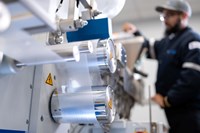UK Students Thrust Magnesium Back into Spotlight
At 1.8 g/cm³, magnesium is the lightest of all structural materials. It also is the eighth most abundant chemical element in the earth’s crust and is completely recyclable.
Students in Birmingham, UK, are being challenged to showcase the potential uses of magnesium within the aerospace sector as part of a competition sponsored by Birmingham City University and Meridian, the world’s largest producer of magnesium components.
At 1.8 g/cm³, magnesium is the lightest of all structural materials. It also is the eighth most abundant chemical element in the earth’s crust and is completely recyclable. However, misconceptions surrounding the element’s properties have resulted in a historical aversion to designing products with magnesium instead of less-sustainable and heavier metals.
The parameters of this competition aim to alter these perceptions. The result will be an interdisciplinary art installation designed by students that will be showcased to experts at the university, Meridian and the International Magnesium Association (MIA), which also is supporting the project. The organizers hope that if the winning prototype inspires further investment, a full-scale version will be crafted from magnesium and exhibited in a partner venue.
“A lot of people still believe magnesium catches fire easily,” says Makhan Singh, development manager at the Institute for Sustainable Futures at Birmingham City University. “It doesn’t, but the myth still influences most people’s understanding, including engineers. However, while magnesium is not the simplest material to extinguish when alight—it continues to burn in nitrogen, carbon dioxide and water—its thermal conductivity makes it difficult to ignite in the first place.
The competition will also provide the students with an opportunity to work closely with professional artists, designers, engineers, industrial partners and global organizations, with the potential of international exposure for the winning entry and runner-up projects.
“Our Nottinghamshire plant produces around 5,000 net metric tons of die-cast products annually, serving automotive clients such as Daimler, Jaguar, Land Rover, BMW, Ford, Honda, Porsche, and Volvo,” says Kellie Easton, human resources manager for Meridian Lightweight Technologies United Kingdom (MLTUK). “However, a long-standing ban has been lifted for the use of high-pressure magnesium die casting in aircraft seat construction, providing they meet strict performance standards, and we see this as an opportunity to work with aircraft seat manufacturers who may soon start using lightweight, new-generation magnesium alloys in their seats.”
Birmingham City University and Meridian last year agreed to form a strategic partnership, which has led to the two organizations working together in education, research and development related to magnesium use. They say the partnership is placing fuel efficiency through weight savings and sustainability at its core, and last year they joined forces for an inaugural magnesium symposium held at the university’s City Centre Campus in Birmingham.
The competition was launched on February 15, and individuals and teams from across the the university’s four campuses will have two months to finesse their ideas before the submission deadline in April. In attendance at the launch were Professor Julian Beer, deputy vice chancellor, Birmingham City University; Easton and Stephen Brown, engineering manager, MLTUK; and Councillor Shafique Shah; as well as representatives from the university’s multidisciplinary Magnesium Innovation Group and participating students.
Related Content
-
Trivalent Chrome Overview
As the finishing industry begins to move away from the use of hexavalent chromium to trivalent chromium, what factors should finishers consider as they make new investments? Mark Schario, chief technology officer for Columbia Chemical offers a helpful overview of this complicated topic.
-
An Overview of Electroless Nickel Plating
By definition, electroless plating is metal deposition by a controlled chemical reaction.
-
A Chromium Plating Overview
An overview of decorative and hard chromium electroplating processes.















